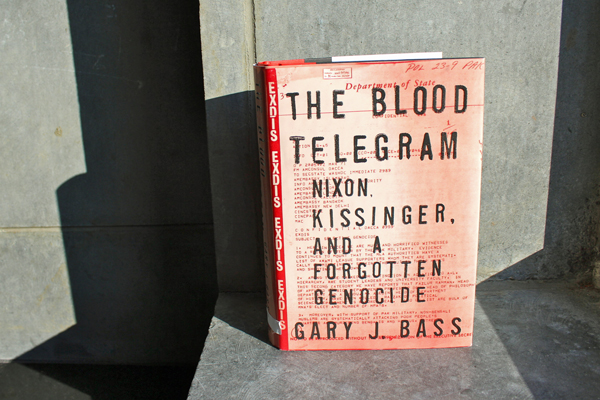
By McGill Reporter Staff
Gary Bass, author of The Blood Telegran: Nixon, Kissinger and a Forgotten Genocide, captured this year’s $75,000 Cundill Prize in Historical Literature at McGill.
Chancellor Michael A. Meighen and Dean of Arts Christopher Manfredi announced the winner Thursday night at a gala awards dinner in Toronto.
Now in its seventh year, the Cundill Prize is the world’s most lucrative international award for a nonfiction book. Published by Knopf, The Blood Telegram tells a horrifying story of the Pakistani state’s genocidal war on the people of Bangladesh, and the United States’ sad record of complicity.
The book provides the first full account of Richard Nixon and Henry Kissinger’s secret support of Pakistan in 1971 as it committed shocking atrocities in Bangladesh, which led to war between India and Pakistan, shaped the fate of Asia, and left major strategic consequences for the world today.
“I was doing research for an earlier book in Bosnia after the war there, and randomly brought along a book and read something about this slaughter in Bangladesh, which embarrassingly I knew nothing about,” Bass said in an earlier Reporter article. “That stuck in my mind, and much later I had the time to do some digging to remedy my ignorance. Kissinger’s version of what happened in his memoirs was obviously incomplete, so I did some more digging, and realized that this was going to require much more sustained work in archives and the Nixon tapes. As it unfolded, it was stunning how much more there was to the real story.
“It would be good for people to remember this important chapter of the Cold War,” said Bass, a professor of politics and international affairs at Princeton University. “Every reader will judge Nixon’s and Kissinger’s actions in their own way, and it’s not up to me to dictate what they should take away from it, but at least they should be aware of the core facts, and then we can have that debate properly.”
The other two finalists, Richard Overy for The Bombing War: Europe 1939-45 (Allen Lane), and David Van Reybrouck for Congo: The Epic History of a People (ECCO), were each awarded a “Recognition of Excellence” prize of US$10,000. The finalists were selected from 165 submissions received from 70 publishers worldwide.
“I’d like to thank the Cundill Prize jury, who have done a remarkable job in reading through this year’s submissions, which were some of the strongest we have seen to date, to bring us three outstanding finalists” said Prof. Manfredi, who serves as Administrative Chair of the Cundill Prize. “I also congratulate our finalists, who have dedicated years of hard work to the research and writing of the books we celebrate tonight. These three books not only reveal the past, but also show that history shapes who we are, as individuals and as societies.”
This year’s Cundill Jury included David Frum, author and a senior editor for The Atlantic; Marla R. Miller, Professor and Director, Public History Program and Graduate Program Director, the University of Massachusetts; Stuart Schwartz, Professor, Department of History, Yale University and the winner of the inaugural Cundill Prize; Thomas H.B. Symons, Founding President and Professor Emeritus, Trent University; and Althia Raj, Ottawa Bureau Chief for Huffington Post Canada.
The Cundill Prize in Historical Literature at McGill was established in 2008 by McGill alumnus F. Peter Cundill, who died in January 2011. The prize is administered by the Dean of Arts, with the help of the McGill Institute for the Study of Canada (MISC), and is awarded annually to an individual who has published a book determined to have had a profound literary, social and academic impact in the area of history.
